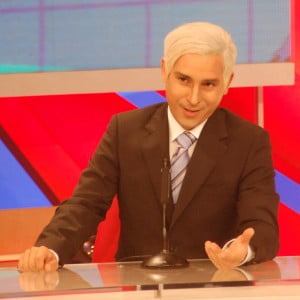Is it too late for Bibi, Livni, Shelly and co. to switch from somewhat empty promises to good old knock-knock jokes? According to a recent study, if you want to influence people’s belief, you have to make ’em laugh!
Right in time for the upcoming general elections in Israel, a study from the University of Haifa shows that political satire television shows strongly impact people’s political thoughts. According to the study, the more political comedy people consumed, the more they thought about which political party to vote for.
“The correlation between these two variables indicates the importance of political entertainment in the Israeli election campaigns,” say Professor Gabi Weimann and Professor Yariv Tsfati, who conducted the study, in cooperation with Doctor Tamar Shafir from the Hebrew University’s School of Communications and Political Science.
Related articles
- President Peres Launches Savvy New Media Campaign Urging Israelis To Vote
- Deeyoon: Debate Anyone, About Anything On Video Chat
Much has been said about how entertainment shows dealing with political issues have become, in many ways, a main news source for Israelis. This recent study adds to this notion by showing that during the 2009 Israeli elections, these shows had a significant impact on the electoral outcome.
During the research, subjects were asked to report their political content consumption habits during the three weeks leading up to the elections, in several categories: television news, television campaign spots, political comedy shows and political websites. In addition, subjects were also asked at which point they formed their final opinion and if it had changed over time.
Comedy is king (or at least, prime minister)
Data gathered has shown that exposure to television news was mediocre, exposure to internet campaigns was low and exposure to television spots was almost nonexistent. In addition, the study found that people who watched the news formed their opinions earlier than those who hadn’t. This last conclusion further emphasizes the importance of political comedy: exposure to such content was the only variant that correlated positively with late and more though-through decision-making.
Although the influence of media is very hard to measure, researchers say that the study has pointed towards certain trends. “When exposure to a certain medium is so low, one could assume that its influence can’t be that great. Moreover, the fact that people who watched more news made up their minds sooner, further weakens the possibility of the media’s influence, since it is logical to assume that influential media would cause people to think more, second-guess and decide at a later stage. In the 2009 election [late decision making] correlated only with political comedy [consumption],” say the researchers.
Photo by DonkeyHotey
Related posts

Rehabilitation Nation: Israeli Innovation On Road To Healing

Israeli High-Tech Sector 'Still Good' Despite Year Of War






Facebook comments